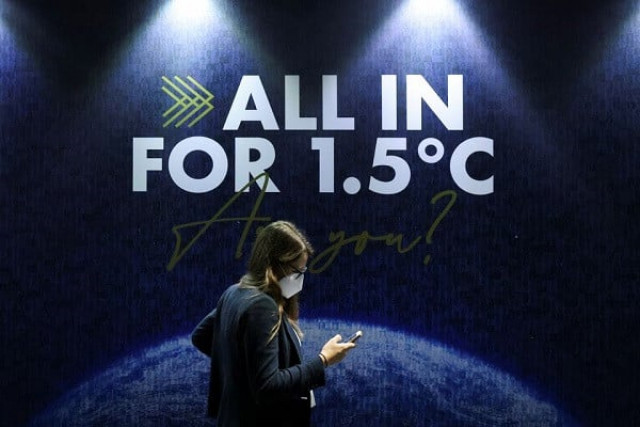COP26 aftermath: business or green revolution?
World is talking of small incremental changes instead of debating on larger climate issues

The Glasgow affair has ended but the climate debate is far from over. With misplaced optimism on mere promises, we did not see any deal closing on compensation to vulnerable countries for climate change related damages. After decades of denial and delay, we are still talking of small incremental changes instead of debating on larger issues such as incompatibility of green policies with the free trade rules.
We did not see commitments from the US and the EU to reduce their consumption per capita and while 400 private jets were flown into Glasgow for the CoP26 event, world leaders had the audacity to tell third world countries to curb their carbon footprints.
Riddled with doublespeak, the negotiation tables remained under the influence of special interest groups such as the fossil fuel lobby and international bankers. On the other hand, the civil society groups were kept outside to protest on the streets.
It was a breath of fresh air when policymakers tried squaring a big circle over pledges to phase out fossil fuels and old coal based power plants. China and India are huge consumers of coal and both of them rely heavily on coal-powered energy generation to sustain their economic growth. Indian journalist Vijay Prashad took a harsh stance and made a case that the climate movement would have no legs in the third world unless world leaders stopped condescending upon us for not committing enough to the so-called climate cause.
India’s opposition to phase out coal comes at a time when it is facing a lockdown in its capital New Delhi because of toxic air quality –in which the burning of coal is the biggest contributor.
This hypocrisy is not limited to third world countries like India and the self-serving duplicity is evident in the policies of the west too.
While the US is pitching the world to invest in clean energy on one hand, it is pushing its domestic oil companies to drill even more on the other. Just a week after the CoP26, the US auctioned 80 million acres in the Gulf of Mexico to private oil companies. Similarly, Norway is against mining of natural gas in Africa but on the flip side, it is constantly trying to boost its own production to garner more profits.
An alternative to fossil fuels is nuclear power which is, beyond doubt, considered the cleanest and safest means of generating electricity with almost zero carbon emission. However, it is not being pitched as a preferred pathway to achieve the ‘net zero’ as it goes against the interests of the fossil fuel lobby. Representatives from the nuclear industry were in fact barred from attending the CoP26 conference. At the same time, nuclear plants in the west are being decommissioned for ‘strategic’ reasons.
The good news is that almost 200 countries reached a consensus on long-standing issue of Article 6 in the Paris Agreement. This means that corporations with large carbon footprints can sponsor solar farms, deforestation plans, or conservation projects in diverse parts of the world say in Latin America, and claim credits under the voluntary offsetting scheme. With 70% nations pledging to end deforestation by 2030, this offset scheme could lead to a moderate success. Financial institutions representing $130 trillion in capital have already pledged to transform the global economy but the conditions that came with the agreement are yet to be seen. The only apparent beneficiary of CoP26 is South Africa –that will receive around $8.5 billion over the next five years to phase out coal.
In a nutshell, CoP meetings may seem like a contradiction of sorts and such negotiations naturally appear to be tough because countries need to consider the political economy of their respective nations while agreeing to such ambitious climate goals. The new carbon offset market rules offer an easy way out as wealthy countries could invest in poorer nations and count those credits towards achieving their own national goals. However, this is a slippery slope as countries may end up substituting the hard work of reducing their emissions with this carbon offset trading system. It suits them politically and economically now but if everyone targets the low-hanging fruit only, we will have to bite the bullet eventually.
The writer is a Cambridge graduate and is working as a strategy consultant
Published in The Express Tribune, December 6th, 2021.
Like Business on Facebook, follow @TribuneBiz on Twitter to stay informed and join in the conversation.



















COMMENTS
Comments are moderated and generally will be posted if they are on-topic and not abusive.
For more information, please see our Comments FAQ